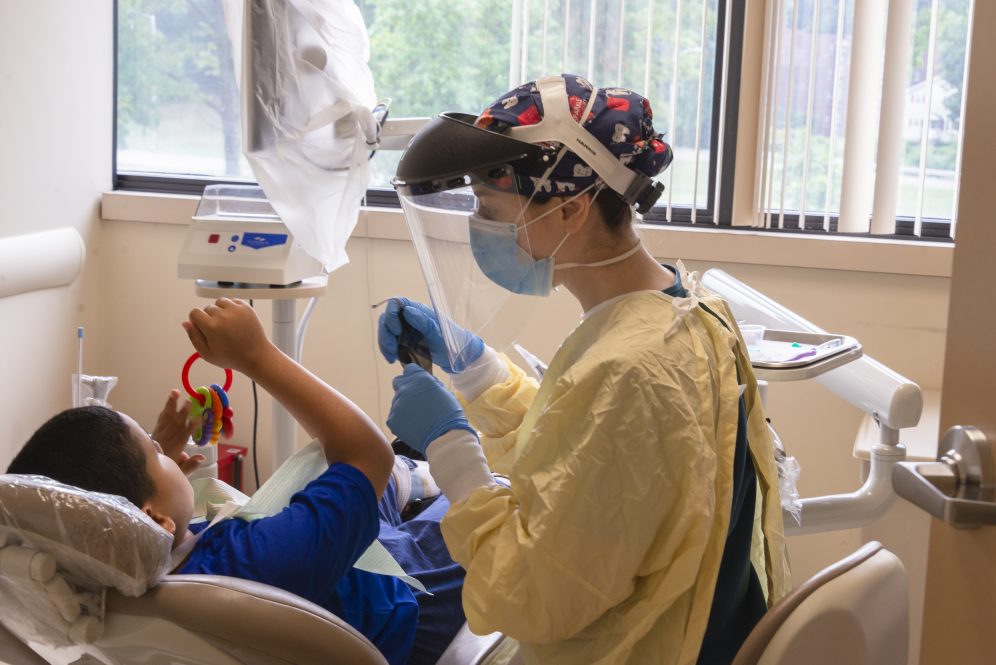In honor of National Children’s Dental Health Month, Dr. Karen Kemp-Prosterman, assistant professor of pediatric dentistry in the School of Dental Medicine and Jaclyn Lerner, registered dietitian with Allied Health Sciences at UConn, teamed up to answer some of the most frequently asked questions by parents with regards to their child’s oral health.
My child can’t get enough sweets. What are some healthy alternatives to help satisfy sweet tooth cravings?
Fruit has a natural sweetness to it that may satisfy those cravings! Canned fruit in juice and frozen fruit without added sugar are great options. These won’t spoil as quickly and are often cheaper than fresh fruit. Pairing the fruit with a protein (such as apples with peanut butter or berries with greek yogurt) will make for a nutritious and filling snack for children. Sweets can be part of a healthy diet, too! When serving sweets, serve with a nutritious meal of fruits, vegetables, whole grains, and healthy proteins. This can also help with dental health, as increased saliva from the meal and drinking water can wash away remaining sugar from the teeth.
Are cavities only caused by sugary foods? Does eating healthier options reduce the risk of getting cavities?
Cavities are caused by the breakdown of sugars in the mouth, but foods other than “sugary foods” are made up of sugar. Some non-sweets examples are refined grains like white bread, white pasta, white rice, many types of crackers, and many types of cereals. Another example is fruit juice, even 100%. Eating healthier options does reduce the risk of getting cavities. Whole grains, such as whole wheat bread, whole wheat pasta, and brown rice, do not break down into as much sugar in the mouth. The same is true for whole fruit compared to juice, and chewing whole fruit stimulates saliva production. Try diluting 100% juice with water and monitor the frequency when given.
Any tips to help calm nerves before a visit to the dentist?
Children often follow by example, so give your child a more positive outlook on dental visits by using positive pre-visit imagery. Find dental videos that show a positive example similar to your child’s upcoming visit. Many dental offices are engaging parents, especially during the pandemic, in providing virtual office tours or schedule a consultation appointment, to allow the dental provider to demonstrate behavioral guidance techniques like Tell-Show-Do and Ask-Tell-Ask.
What are some tips to get children to establish brushing habits at an early age?
Tooth brushing is encouraged as soon as the first tooth appears in the mouth. As early as 1 year of age parents are encouraged to establish a dental home to help their child become familiar with dental providers and to learn essential tips on dental hygiene and nutrition. Dentists typically use these visits to provide helpful tips, like the following to parents:
• Role play with your toddler during brushing.
• Take turns, allow them to practice without toothpaste and then add if advised when it’s your turn.
• Sing, dance and play games, make it fun!
• Keep a consistent routine to help your toddler. For example, you can make it a part of your bath time routine.
• Finally, be the role model! Demonstrate good oral hygiene habits for your child to imitate.
My teenager is feeling the stress of this pandemic and I’ve noticed he’s clenching his teeth more than usual. What can I do to help in this situation?
Dentist nationwide have noticed increased reports of adolescents and adults experiencing grinding (bruxism) and clenching of their teeth with possible serious effects to the Temporomandibular Joint (TMJ). While we wait for resolution on a national scale to the pandemic, parents aware of this situation should encourage the following:
• Encourage regular exercise to relieve stress. Introduce meditation or yoga videos to your teenager as options of managing stress.
• Monitor your teens anxiety level and focus on introducing positive news or events to provide a balance outlook.
• Use palliative techniques: warm/ cold compress, avoid excessive gum or ice chewing habits that increase discomfort.
• If symptoms persist, a visit to your dental provider is strongly encouraged. Causes of Temporomandibular Disorders (TMD) require a detailed history and clinical assessment by a dental provider and possibly referral to a specialist. Treatment options can range from OTC pain management, jaw exercises or may require additional clinical diagnosis and management.



